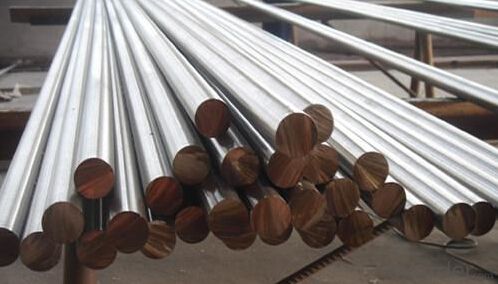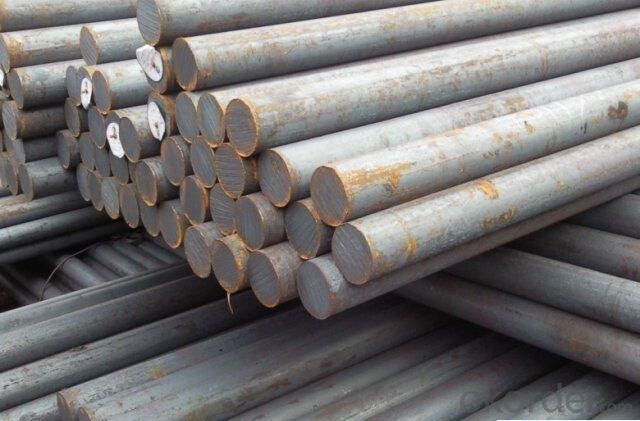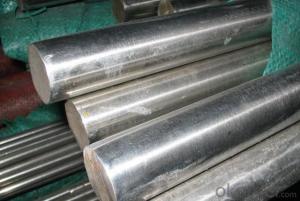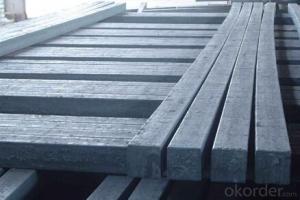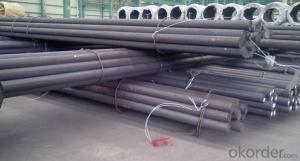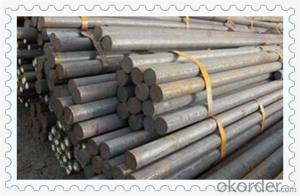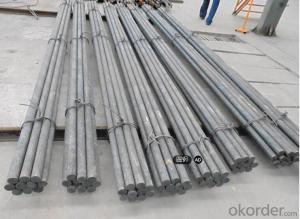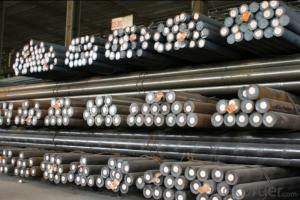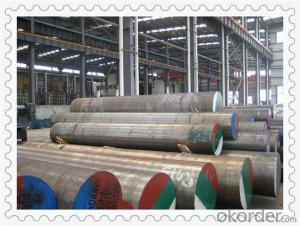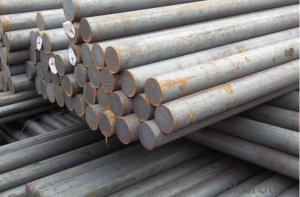Grade AISI1045 CNBM Carbon Steel Round Bar
- Loading Port:
- Shanghai
- Payment Terms:
- TT OR LC
- Min Order Qty:
- 20 m.t.
- Supply Capability:
- 10000 m.t./month
OKorder Service Pledge
OKorder Financial Service
You Might Also Like
Specification
Specifications:
Material | 1045 | Round bar | Dia(mm) | 16-300 |
Process | EAF + LF + VD + Forged + Heat Treatment (optional) | Length (mm) | Max 12000 | |
Heat treatment | Normalized / Annealed / Quenched / tempered | Flat bar | Thickness(mm) | 8-500 |
Delivery condition | Hot forged +Rough machined (black surface after Q/T)+ Turned (optional) | Width(mm) | 70-200 | |
Test | Ultrasonic test according to SEP 1921-84 D/d | Length (mm) | Max 12000 | |
Chemical Composition:
C | Si | Mn | S | P | Cr | Ni | Mo |
0.42~0.50 | ≤0.40 | 0.50~0.80 | ≤0.045 | ≤0.045 | ≤0.40 | ≤0.40 | ≤0.10 |
Usage and Applications:
Mold bottom
Plastic mold
Construction machinery parts
Automobile parts
Security grills
Screens
Construction
Packaging & Delivery:
Packaging Detail: Standard seaworthy packing or as customer required; all goods are packed in bundle with steel strips and shipped by break bulk vessel or container
Delivery Detail: 45 days
Production Flow:
EAF+LF+VD+ Forged+ Heat Treatment
Material prepare (billet) — heat up — rough rolling — precision rolling — cooling — packing — storage and transportation
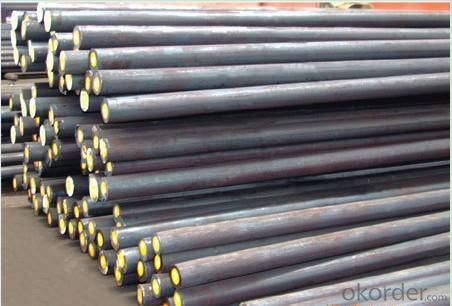
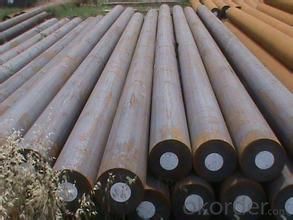
Quality Assurance:
1. We will strictly inspect our production that we sold according to the customer’s request.
2. Our steel reaches international quality standards.
3. Quality should be in conformity with the specification of the manufacturer. Quantity and packing conditions should be in conformity with the term in the contract.
4. Should the packing found damaged, the buyer has the right to claim to the seller
- Q: How does special steel perform in terms of electrical resistivity?
- Special steel typically has higher electrical resistivity compared to other types of steel. This means that it offers greater resistance to the flow of electric current, making it less conductive.
- Q: How does wear-resistant steel protect against abrasive wear?
- Wear-resistant steel protects against abrasive wear by having a high hardness and toughness, which allows it to withstand the abrasive forces and prevent material loss or surface damage. The steel's composition and heat treatment provide it with enhanced resistance to abrasive particles, reducing wear and extending the lifespan of the material.
- Q: What are the different stamping grades of special steel?
- Various industries utilize different grades of special steel for stamping purposes. Some commonly used stamping grades are as follows: 1. Low Carbon Steel: This special steel grade is renowned for its exceptional formability and weldability. It finds extensive use in applications necessitating deep drawing or intricate bending. Moreover, low carbon steel is both cost-effective and readily available, making it a highly preferred choice for stamping processes. 2. High Strength Low Alloy (HSLA) Steel: HSLA steel, a type of special steel, incorporates small amounts of alloying elements like copper, nickel, or chromium. This grade offers superior strength and enhanced toughness compared to low carbon steel. It is commonly employed in automotive components, structural parts, and other applications demanding strength and durability. 3. Stainless Steel: Stainless steel is a corrosion-resistant special steel comprising a minimum of 10.5% chromium. It is frequently employed in stamping applications that require resistance against rust, staining, and corrosion. Stainless steel is available in various grades, such as 304, 316, and 430, each offering distinct levels of corrosion resistance and mechanical properties. 4. Tool Steel: Tool steel, a high-quality special steel, is specifically designed for applications necessitating resistance to wear, deformation, and high temperatures. It is commonly used in stamping dies, cutting tools, and other applications where hardness and toughness are vital. Notable tool steel grades include D2, A2, O1, and M2, among others. 5. Electrical Steel: Electrical steel, also known as silicon steel, is a special grade characterized by high magnetic permeability and low electrical conductivity. It finds application in stamping operations requiring efficient magnetic properties, such as transformers, motors, and generators. The aforementioned examples represent only a fraction of the stamping grades available in special steel. The selection of each grade depends on the specific requirements of the application, such as strength, corrosion resistance, magnetic properties, or formability.
- Q: Can special steel be used for food processing equipment?
- Yes, special steel can be used for food processing equipment. Special steel, such as stainless steel, is commonly used in the food industry due to its excellent corrosion resistance, durability, and hygienic properties. It is resistant to rust, staining, and bacterial growth, making it ideal for food processing equipment where cleanliness and safety are crucial.
- Q: Can special steel be used in cryogenic applications?
- Yes, special steel can be used in cryogenic applications. Special steels, such as austenitic stainless steels like 304 or 316, are commonly used in cryogenic applications due to their excellent mechanical properties and resistance to low temperatures. These steels are able to maintain their strength, toughness, and ductility even at extremely low temperatures, making them suitable for use in cryogenic environments. Additionally, special steels can also exhibit good resistance to corrosion and thermal expansion, which are important factors to consider in cryogenic applications. Overall, special steel alloys are well-suited for use in cryogenic applications due to their unique combination of properties that enable them to withstand and perform in extremely cold conditions.
- Q: What is the process of manufacturing special steel?
- The process of manufacturing special steel involves several steps. Firstly, raw materials such as iron ore, coal, and limestone are gathered and processed to create molten iron in a blast furnace. Next, impurities like carbon, sulfur, and phosphorus are removed through various refining techniques. Once the desired composition is achieved, the molten iron is transferred to a steelmaking furnace, where alloying elements like chromium, nickel, or manganese are added to impart specific properties. The mixture is then refined further to remove any remaining impurities and to adjust the temperature and composition. After refining, the molten steel is cast into various shapes such as blooms, billets, or slabs, depending on the desired end product. These primary forms are then subjected to hot rolling, forging, or extrusion processes to shape them into the desired final products, such as bars, plates, or wires. Finally, the manufactured steel undergoes heat treatment processes like annealing, quenching, or tempering to enhance its strength, hardness, and other mechanical properties. It is also subjected to quality control measures to ensure it meets the required specifications. Overall, the process of manufacturing special steel involves a combination of raw material preparation, refining, casting, shaping, heat treating, and quality control steps to produce steel with specific properties tailored to meet diverse industrial needs.
- Q: How is special steel used in the production of turbine shafts?
- Special steel is used in the production of turbine shafts due to its high strength, durability, and resistance to extreme temperatures. These shafts are subjected to significant stress and rotational forces, making it crucial to use a material that can withstand these conditions. Special steel alloys, such as nickel-based or stainless steel, offer excellent mechanical properties and corrosion resistance, ensuring reliable and efficient operation of turbine systems.
- Q: What are the potential health hazards associated with working with special steel?
- There are potential health risks when working with special steel due to the materials and processes involved. Some of the main health hazards associated with this work include: 1. Inhaling harmful fumes: Special steels often contain various alloys and elements, such as chromium, nickel, and manganese. These can release toxic fumes when heated or welded. Prolonged exposure to these fumes can cause respiratory issues like bronchitis, asthma, or even lung cancer. 2. Irritation of the skin and eyes: Steelworking involves handling sharp edges, cutting tools, and abrasive materials, which can cause cuts, scratches, or puncture wounds. If not treated properly, these injuries can become infected or lead to more serious conditions. Additionally, contact with certain alloys in special steel can irritate the skin or cause allergic reactions. It's important to wear eye protection to prevent injuries from debris or sparks. 3. Hearing loss caused by noise: Steel manufacturing processes often involve heavy machinery, which creates high levels of noise. Prolonged exposure to this noise can result in permanent hearing loss or other auditory issues. Using appropriate hearing protection, like earmuffs or earplugs, can help reduce the risk. 4. Hazards related to ergonomics: Steelworking often requires repetitive movements, heavy lifting, or uncomfortable postures. This can lead to musculoskeletal disorders such as back pain, carpal tunnel syndrome, or tendonitis. Employers should implement proper ergonomic practices, such as adjustable workstations, lifting aids, and regular breaks, to prevent these hazards. 5. Thermal hazards: Special steel manufacturing processes involve high temperatures, such as welding or forging. Without proper protective clothing or equipment, this can result in burns. Exposure to extreme heat can also lead to heat-related illnesses like heat exhaustion or heat stroke. Adequate training, appropriate personal protective equipment (PPE), and regular breaks in cooler areas can help reduce these risks. To protect workers from these potential health hazards, employers should follow proper safety protocols. This includes providing employee training, ensuring the use of personal protective equipment, conducting regular health monitoring, and maintaining a clean and well-ventilated work environment. It is important to strictly adhere to occupational health and safety regulations in order to minimize the risks involved in working with special steel.
- Q: How does special steel contribute to reducing production costs?
- Special steel can contribute to reducing production costs by offering improved durability and wear resistance, allowing for longer tool life and reducing the need for frequent replacements. Additionally, special steel's enhanced machinability can lead to faster production speeds and increased efficiency, resulting in cost savings.
- Q: How does special steel perform in corrosion fatigue conditions?
- Special steel performs well in corrosion fatigue conditions due to its high resistance to corrosion and fatigue. It is specifically designed to withstand harsh environments and prolonged exposure to corrosive elements. Special steel undergoes various treatments and alloying processes to enhance its corrosion resistance and mechanical properties. This allows it to maintain its structural integrity and performance even under corrosive and fatigue-inducing conditions.
Send your message to us
Grade AISI1045 CNBM Carbon Steel Round Bar
- Loading Port:
- Shanghai
- Payment Terms:
- TT OR LC
- Min Order Qty:
- 20 m.t.
- Supply Capability:
- 10000 m.t./month
OKorder Service Pledge
OKorder Financial Service
Similar products
Hot products
Hot Searches
Related keywords


